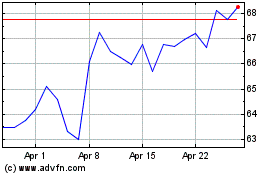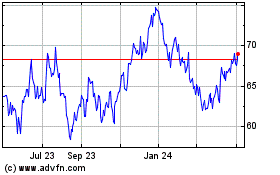Commodities Slump Batters Rio Tinto
February 12 2016 - 3:02AM
Dow Jones News
(FROM THE WALL STREET JOURNAL 2/12/16)
By Rhiannon Hoyle
SYDNEY -- Rio Tinto on Thursday lowered its dividend and slumped
to an annual loss, effectively conceding it had misread the
strength of China's commodities demand, signaling a new era of
diminished returns for mining investors.
Rio Tinto said it could no longer justify its commitment to
maintaining or steadily increasing its dividend each year when the
global economic outlook is worsening and the prices for many
commodities that the company produces, such as iron ore and coal,
are at multiyear lows.
"Future dividend outcomes will really rely on the market
conditions," Chief Executive Sam Walsh said.
"We don't run our business on hope," he said.
The dividend cut marks a decisive blow to the notion that
commodities companies were safe investments even during a prolonged
market slump. Rio Tinto and other mining companies ramped up
investor payouts for years to remain attractive to big investors
such as pension funds.
Its chief rival, BHP Billiton, the world's most valuable mining
company, is expected to abandon its progressive dividend at or
before its earnings announcement on Feb. 23. Swiss mining and
trading company Glencore PLC and the U.K.'s Anglo American PLC have
already slashed theirs to hoard cash during the current
downturn.
But Rio Tinto had been seen as a relatively strong performer
compared with such rivals, and its move highlights the substantial
measures mining companies are taking to bring their expenses in
line with their revenues.
"This signals a dramatic change in both the outlook for the
company and the industry," Citigroup said in a note about Rio
Tinto's results. "It does, however, align the dividend policy to
cash flow of the business."
Rio Tinto said this year's annual dividend could be roughly half
the US$2.15-a-share payout declared for 2015, a blow for investors
who supported years of heavy investment in new mines, especially in
Australia's remote Pilbara region.
In the run-up to Thursday's result, most brokers had argued that
Rio Tinto wouldn't need to pare this year's payout. Some said it
was the wrong move.
"I would have liked to see them hang on for longer," possibly
two or three more years, said Nik Stanojevic, an equity analyst at
Brewin Dolphin Ltd., a $44 billion private-wealth manager.
Mr. Walsh said changing gears was "prudent."
"I don't think anybody predicted what is happening in the world
economy today," he said.
Rio Tinto also reported a net loss of $866 million for 2015 on
Thursday, compared with a profit of $6.53 billion a year earlier.
The result was weighed down by impairment charges totaling $1.8
billion against the company's Simandou iron-ore project in Guinea
and uranium assets in Australia and Canada, as well as $3.3 billion
in foreign-exchange and derivatives losses.
Underlying earnings, a measure tracked by analysts that strips
out some one-time costs, fell 51% to $4.54 billion.
Behind Rio Tinto's troubles lies the slowdown in growth in
China, especially in its manufacturing and construction industries.
China buys three in every five tons of iron ore traded by sea to
make steel, and relies on Australia for most of its imports.
Rio Tinto has spent billions of dollars expanding its mines and
output in recent years. But the company could earn less from its
key iron-ore business this year than it did in 2006, Citi now
forecasts.
(END) Dow Jones Newswires
February 12, 2016 02:47 ET (07:47 GMT)
Copyright (c) 2016 Dow Jones & Company, Inc.
Rio Tinto (NYSE:RIO)
Historical Stock Chart
From Mar 2024 to Apr 2024

Rio Tinto (NYSE:RIO)
Historical Stock Chart
From Apr 2023 to Apr 2024
